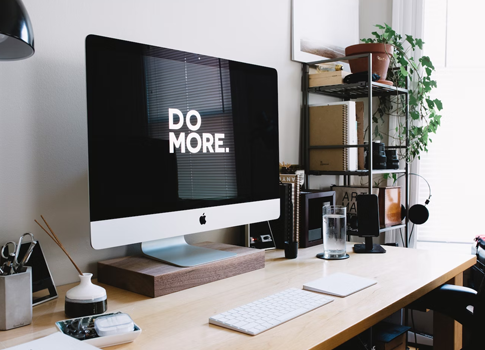It has been many months now since I have worked in the office. Instead, like many of us, I have had to adjust to working remotely, relying on Zoom or Microsoft Teams to communicate with my colleagues and clients. And although things are seemingly moving back to “normal”, it is likely that remote working will be here to stay and so I have identified some insights, backed by behaviour of course, that have helped me to remain productive in these times, as originally shared in an interview with Cambridge and UCL PhD researchers.
1. You’ve got a new ‘audience’: Your colleagues. Communicate to them as you would shape communication to a bespoke audience. Be open and empathetic.
Understanding your audience and adapting your communication shouldn’t only apply to end consumers – but also the members of your team and colleagues.
Keep in mind how they behave in person, their personality, their worries and aspirations when communicating in order for the message to be received the way you expect it to. The encoding and decoding of information, especially in a remote world with a lack of personal interaction, is tough.
The clearer we are, and the more bespoke we shape our messages, emails and prompts to one’s personality and behaviour, the better the reaction will be. Daily team catch-ups can be fundamental, not only in understanding further who our colleagues are as people but also how uncertainty has changed them.
2. Shape the context and develop the right contextual cues
If you work a lot with people like I do, their wellbeing directly affects your own wellbeing, especially if their performance impacts the output of your work. Therefore more often than not, developing the right contextual cues for your colleagues is even more important than knowing how they normally behave.
In that respect, it is essential to avoid putting people in tough situations where they have to completely readapt, without prior experience in doing so or performing a task in a new setting. Therefore, put people in comfortable situations first; start out with easy tasks moving on to harder ones as the person gets more comfortable performing that task in a different setting than an office setting.
This is linked to the Fundamental Attribution Error, where we attribute mistakes to someone’s personality or disposition but actually we need to reflect and see what we could do to facilitate adaptation, as it is often the context they are put in, not the person.
3. Remote working can make you more results focused. Focus on a personal preference to get the desired output
There’s not really a general rule of thumb for empowering one’s own self, so everyone should work on a strategy that works for them to make them work more efficiently.
In WFH settings, people tend to reinforce heuristics (shortcuts) focusing more on the output than the method to get to it as they are not being as closely looked at, as they would be in an office surrounded by people.
Indeed, there is a lack of visibility regarding what people do and the way they perform their task; which is why the end-result is what usually gives an understanding on whether or not they are performing according to expectations.
Building trust is essential here and would reinforce people’s motivation and drive. Knowing that people will deliver to your expectations reinforces the team bond. Nothing should be imposed on anyone, as they are adapting like everyone else and everyone has their own style. For example the option to mute notifications should be respected if it is to get the desired output, which is why it is also fundamental to respect a colleague’s preferred context and keep communication open within the team if this is the case.
Creating a communication plan with your team can be vital to understand the different and most productive work styles; which would also shape a smoother context for adaptation. We do that daily with our team and it works really well. There is no need for micro-managing, but rather trusting that in the right context, we will get results.
4. Combatting platform fatigue
Reflecting on oneself (or on one’s team) and fixing the WFH process is essential, and a key aspect of this is the multiplication of platforms. This can create a bottleneck in efficiency; therefore it is essential to be conscious to combat it by implementing a smoother process.
One of the ways to do this is for instance is by combining a few tasks (where possible) in one core platform. As a team, choose your platform of choice, preferably one that aggregates different admin areas (e.g. to-do list per team member, timesheets etc.) and proceed with it when you kick off your day; instead of accessing several ones. This, without a doubt, has increased productivity, especially with lesser screens at our disposal.
5. Accept uncertainty. Uncertainty allows for a unique time to experiment with work!
Taking in the emotions from this uncertain time made me more creative and open to experiences.
This can be linked to the big shifts in consumer behaviour that we see happening when important, life-changing events happen. For example, people are more likely to be risk savvy, try new things and make impulsive choices when going through a divorce as a way to find themselves or re-explore themselves irrespective of another human being.
Similarly, we are likely to try new things in those times, especially a major global event like the Coronavirus. This can relate to new music genres to explore, new recipes to learn, a new bucket list for the future; or anything that someone might’ve regretted not following through before the world has shifted.
Events like these mean that we are tempted to extend our creativity – so acting on that provides us with major productivity peaks! This also applies to work and experimenting on a professional level in order to come out of this even better and stronger.
6. Times of uncertainty can lead to increased productivity
From my experience, I have realised that the behavioural tendency to want to claim back a sense of control in our lives when exposed to uncertain situations positively affects productivity.
At first, my adaption to working from home meant that, with my commute time eliminated, I was waking up just before I was due to start work and then rushing to my desk without having any time to adjust and get into the right mind-set for work.
Two weeks into my WFH routine, I realised that this was not sustainable. A healthier routine needed to be put in place. In an attempt to re-gain control over my life, I decided to wake up earlier, as if I was going to the office, and use that time to chill with a coffee. Furthermore I utilised the idea of forming habits from BJ Fogg whereby I listen to my usual commute music, to bring a sense of familiarity and act as a trigger to get into work mode.
Subsequently, I would reflect a bit and think my day through and list my priorities. Increasingly I realised that the more I used that time to plan for the day ahead, the easier my day was. I had more control and more time to wave through any unexpected work situations.
7. Remain a social creature!
The office space is not necessarily a reflection of productivity, but rather a common identity, a place to be with other people. Not losing this bond and actively assessing the effects that isolation had on me led me to reconnect with some people and has helped me to stay productive.
The world has seen co-working spaces (like WeWork) increase over the past few years. People seek purpose, people want peer-to-peer interactions, somewhere to go and be inspired by other people working. That’s why it’s key to still do short video calls with colleagues to talk about different things.
Although there’s not always much to say at the moment, communicating how you feel with colleagues you are close to and who witnessed your most stressful moments is extremely important.
However, it is essential to keep in mind that Zoom fatigue exists and people are burnt out, so knowing when to reach out is important. This also requires staying close to colleagues and knowing when they are ready and willing to talk.
8. Stay in touch with the industry
In addition to staying in touch with office culture, remaining connected to the industry is important to keep motivated and dive further into your passion.
For me, watching webinar recordings, as well as participating in my own has enabled me to stay connected to my job and enabled me to feel like I am still moving forward in a world that feels on hold.
9. The human brain has been trained to rewire itself quite quickly, and this has worked in our favour! We shouldn’t forget it.
The world has changed drastically over recent years! We have rewired to a novel, digitalized world, where our ability to focus on more than one thing at a time has completely shifted and we’re being bombarded with alternatives; making us greater multitaskers.
Therefore, nowadays, humans are far more equipped to readapt, compared to the last century. For example, before Covid-19, many companies were already implementing one day remote per week for flexibility reasons due to the changing, globalisation of the world and the acceleration of the digital world, enabling working from all over the world.
Therefore, the shift has not been as big as we think it has. Naturally, this still depends on how traditional a company was prior to the pandemic. But in general, many companies were already transitioning the way they work and Coronavirus has accelerated it.






